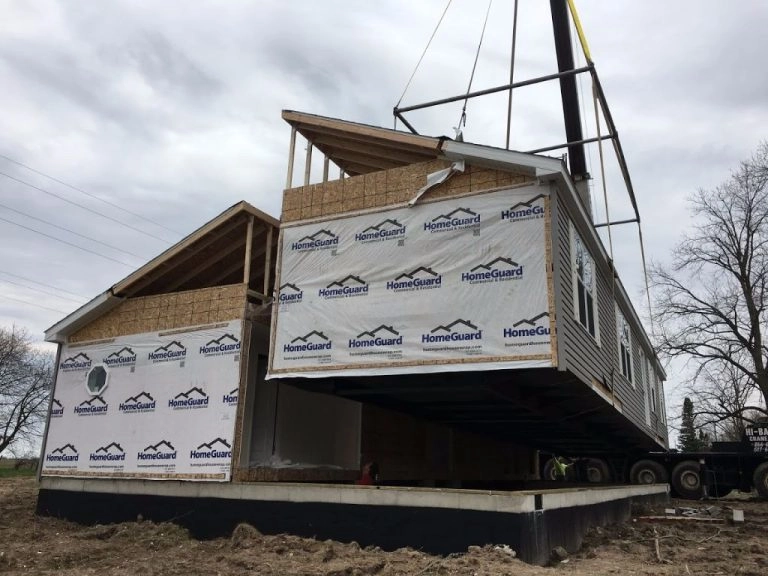What Is a Modular Home Loan?
A modular home loan is used to finance a modular home that is constructed in sections in a controlled factory environment and then transported to the property for on-site assembly. Once assembled, the home is permanently affixed to a foundation and is treated as site-built construction for lending purposes.
In Lincoln, Omaha, and throughout Nebraska, modular homes are commonly financed using traditional mortgage programs because they meet the same building codes and appraisal standards as site-built homes. This allows many conventional, FHA, VA, and USDA loan options to apply when the project is structured correctly.
Modular home loans can be used for both new construction and refinances. During construction, funds are typically released in stages as the home is completed, and once the home is finished, the loan converts into permanent financing. This structure provides long-term stability while supporting modern construction timelines.
Because modular homes follow site-built lending guidelines, qualification is based on borrower credit, income, and property details rather than factory construction methods. Proper documentation and contractor approval are key to a smooth process.

Potential Benefits of a Modular Home Loan
Modular home loans combine modern construction with traditional mortgage financing.
Treated as Site-Built Construction
Modular homes are financed using standard mortgage guidelines once permanently installed on a foundation.
Wide Loan Program Compatibility
Many conventional, FHA, VA, and USDA loan programs can be used for modular home financing when guidelines are met.
Efficient Construction Timelines
Factory-built sections often reduce weather delays and improve build efficiency compared to traditional on-site construction.
Long-Term Financing Stability
Modular home loans provide permanent financing with terms similar to traditional residential mortgages.
Who Might Consider a Modular Home Loan?
Modular home loans combine modern construction with traditional mortgage financing.
- Buyers building a new home on owned or newly purchased land
- Homeowners refinancing an existing modular home
- Borrowers seeking modern construction with traditional financing
- Long-term homeowners planning to occupy the property as a primary residence
Things to Consider
While modular home loans offer flexibility, there are important factors to review:
- The home must be permanently affixed to a foundation
- Builder and contractor approvals are required
- Construction timelines and draw schedules must be coordinated
- Loan Products Offering Modular Home Financing
- Eligibility for loan programs depends on your specific financial situation, credit profile, and property details. This information is for educational purposes only and does not constitute a commitment to lend.
Loan Products Offering Modular Home Financing
Conventional Loans
A conventional cash-out refinance allows qualified homeowners to tap into their home’s equity for expenses such as debt consolidation, renovations, or investments while maintaining competitive interest rates.
FHA Loans
An FHA cash-out refinance provides access to home equity with more flexible credit guidelines, making it a popular option for homeowners who may not qualify for conventional financing.
VA Loans
A VA cash-out refinance allows eligible veterans and service members to access their home equity, often with higher allowable loan-to-value limits and no monthly mortgage insurance.
Reverse Mortgage
A reverse mortgage cash-out refinance lets homeowners age 62 and older convert home equity into available funds without required monthly mortgage payments, helping support retirement income or large expenses.
Non-QM
A Non-QM cash-out refinance is designed for borrowers with unique income situations or credit profiles, offering flexible qualification options beyond traditional lending guidelines.
Jumbo Loans
A jumbo cash-out refinance is ideal for higher-value properties, allowing homeowners to access substantial equity while staying within loan structures designed for larger balances.
Modular Home Loan FAQs
Are modular homes treated the same as site-built homes for financing?
Yes. Once permanently installed on a foundation, modular homes are typically treated as site-built construction for lending and appraisal purposes.
Do modular homes qualify for conventional, FHA, or VA loans?
In many cases, yes. Modular homes that meet program guidelines and building standards can qualify for conventional, FHA, VA, and USDA financing depending on the borrower and property.
Can I use a modular home loan for new construction?
Yes. Modular home loans are commonly used for new construction and often follow a construction-to-permanent loan structure that converts to long-term financing once the home is completed.
Is refinancing an existing modular home allowed?
Yes. Existing modular homes that are permanently affixed to a foundation and meet appraisal standards can often be refinanced using traditional mortgage programs.
